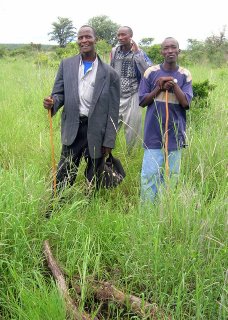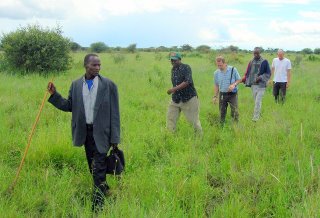The Kenyan structure of government often has ‘duplicate’ jobs at the local level, having both chiefs and district officers. The chiefs are the recognized authority by the community, yet the government consults with the DO. There needs to be consensus from both sides, the traditional and the Western, for anything to move forward.

Myself and Gabriel, a community leader
Sammy Mutua, an emergency and development consultant with CWS, urges communities to involve elders in the decision-making process, like holding a meeting at a proposed borehole site to discuss the way forward. Recently, he told two community representatives Gabriel and Joseph, “The church will pay for the borehole, but then the community will be responsible for maintaining the water source.”
 Two worlds are colliding: How will you keep it together? One way is by writing things down, recording what happened and what people said, so that they can be held accountable later on. It used to be that one’s word was good enough. But now people act as individuals without community accountability. The visible paper is needed.
Two worlds are colliding: How will you keep it together? One way is by writing things down, recording what happened and what people said, so that they can be held accountable later on. It used to be that one’s word was good enough. But now people act as individuals without community accountability. The visible paper is needed.Left: Joseph and Gabriel at Borehole Site
Exact property lines demarcating land boundaries, often visibly marked by a fence, ensure proper security and ownership. There needs to be a deed, and there needs to be a fence. The answer to the question, “Whose land is it?” can change drastically depending on whether the water is below or above ground. Mutua also encouraged the community to secure a deed for a large swath of land so that cattle could graze and vegetable gardens be planted, using viable and valuable female labor.

Gabriel and Joseph agreed to make these decisions with the elders and put them in writing, thus preventing parties from reneging on their commitments. They also recognized the need to train a pump operator as well as the community on pump maintenance and financial management. Mutua encouraged these Sunday church leaders to be community leaders the rest of the week, too.
Commenting on Mutua says, “For CWS, monitoring isn’t just a policy, it is working together... Churches have done a lot of good work on the ground. The problem is that we don’t have the corresponding documentation.” I hope I can play a part in bringing these stories to light for more to read and take action.

Faith and action, word and deed, invisible and visible. Together we can move mountains. Alone we are buried underneath.

No comments:
Post a Comment